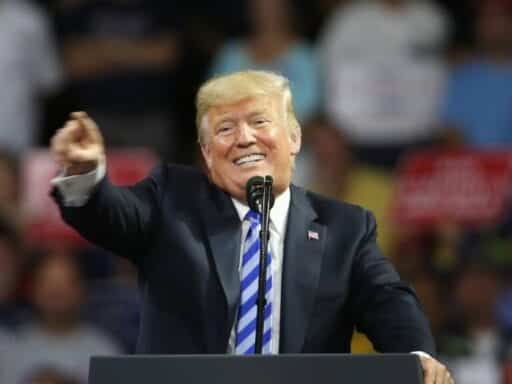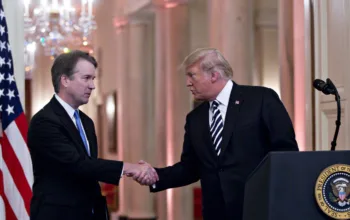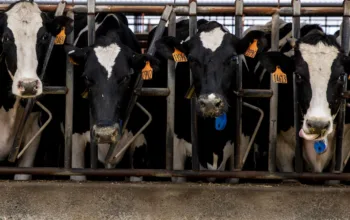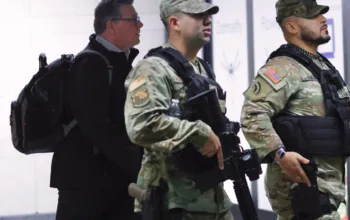Tuesday was a ridiculous news day. Here’s everything that happened.
Tuesday, August 21, 2018, is a day that will live in infamy — or, if not in infamy, at least in the minds and hearts of journalists and news junkies across America.
In very rapid succession, the day saw two major associates of President Donald Trump — Paul Manafort and Michael Cohen — found guilty of serious crimes carrying years-long prison sentences in federal court. It saw another Trump aide — Larry Kudlow — facing accusations that he palled around with a prominent white nationalist. It saw a major Trump ally in Congress indicted for spending hundreds of thousands of dollars in campaign money on personal expenses. And it ended with Trump giving a speech in Charleston, West Virginia that turned into an orgy of pointless digressions and threats to unravel NATO.
If you’re just tuning in, or have glanced at the news but need the chaos boiled down, here’s a brief summary of what happened on Tuesday, and why it matters.
Michael Cohen pleaded guilty to 8 federal crimes, including an illegal payoff to Stormy Daniels — which he said Trump ordered
Trump’s longtime personal attorney, Michael Cohen, walked into a Manhattan courtroom and pleaded guilty to eight federal crimes. He faces up to 65 years in prison, though Fox News reports that he has agreed to a deal in which he’ll serve only three to five years.
The first five counts were somewhat banal tax evasion allegations. The final three counts, though, are the most shocking: one count of making a false statement to a financial institution, one count of willfully causing an unlawful corporate contribution from June 2016 to October 2016, and one count of making an excessive campaign contribution on October 27, 2016.
The false disclosure count related to his application for a home equity line of credit to pay off Trump paramour Stormy Daniels. The unlawful contribution from June 2016 to October 2016 related to his efforts to use Trump’s allies at American Media Inc. (which owns the National Enquirer) to pay off another former Trump paramour, Karen McDougal. And the excessive contribution on October 27, 2016, was Cohen’s transfer of $130,000 to Daniels.
Put another way: Cohen has pleaded guilty in federal court to making hush money payments to women Trump slept with during the presidential campaign. And in federal court, he said that Trump (hilariously referred to in the court documents as “Individual-1,” as in “Individual-1, who at that point had become the President of the United States”) had directed him to make the illegal payoff to Daniels, and that both payoffs were coordinated with the campaign.
These are incredibly serious charges. Several law professors told my colleague Sean Illing that if Cohen’s account can be proven, it means Trump himself is guilty of federal crimes. “Although the president is not named in the charges, he is all but an unindicted co-conspirator,” Duke’s Lisa Kern Griffin told Illing.
“Trump is clearly guilty of violating campaign finance laws and also guilty of federal conspiracy as well (because he agreed with Cohen, and possibly others, on a plan to violate federal law),” Cornell’s Jens David Ohlin said to Illing. “Normally he would be indicted right away. But that won’t happen only because he’s the president.”
In other words, Cohen, a longtime aide to Trump, is now on the record as saying that Trump engaged in a serious federal crime. That is an impeachable offense, and if Trump weren’t president he would likely be charged as well. In a normal presidency, the Cohen plea would be a moment of severe crisis, possibly the beginning of the end. There is no indication from Republicans in Congress that that’s the case now.
Paul Manafort was convicted of 8 federal crimes, carrying a sentence of up to 240 years
Paul Manafort was Donald Trump’s campaign chair, before resigning in August 2016. He also worked, for years, as a Republican political consultant and then, in the ’00s, as a highly paid consultant for pro-Russian politicians in Ukraine, before the 2014 demonstrations that dislodged Manafort’s patron and Ukraine President Viktor Yanukovych from power.
It’s the latter period, his Ukraine period, that led to a criminal trial in Virginia launched by special counsel Robert Mueller, who’s been tasked with looking into the Trump campaign’s possible links to Russia. This trial of Manafort doesn’t relate to possible collusion with Russia on the Trump campaign.
Instead, Manafort faced 18 counts of bank fraud, tax fraud, and failing to report foreign assets. They related to two schemes alleged by Mueller: the “tax scheme,” wherein Manafort poured his Ukrainian money into offshore shell companies and failed to either pay US taxes on the funds or to report them to the US Treasury Department; and the “financial institution scheme,” after Yanukovych was forced out and Manafort was hard on cash, when he lied to banks in New York to try to get mortgage loans.
A Virginia jury found Manafort guilty of eight counts: five of tax fraud for not reporting certain Ukraine income to the IRS; one of failing to report foreign bank accounts in 2012 (but not 2011, 2013, and 2014, for which he was also charged); and two counts of bank fraud related to Manafort’s efforts to fraudulently secure mortgages after the Ukraine money flow stopped. On another 10 counts, including those three 2011/2013/2014 foreign bank reporting counts, the jury deadlocked and Judge TS Ellis III declared a mistrial.
As my colleague Andrew Prokop explains, Manafort is not done with trials. He might face a retrial on the 10 charges where the jury deadlocked, and he will be tried on seven additional charges in DC next month: conspiracy to defraud the United States; conspiracy to launder money; being an unregistered agent of a foreign government; making false and misleading statements related to his foreign lobbying registration; making other false statements to the government; obstruction of justice; and conspiracy to obstruct justice.
Even before those charges, Manafort faces a maximum of 80 years in prison. He will definitely appeal, and he could even be pardoned by Trump, and as Trump’s loyalists like to emphasize, the charges on which he was convicted were not directly related to his work for Trump.
Nonetheless, it’s huge news that the former head of the sitting president’s campaign has been convicted of multiple serious federal felonies. Nothing quite like this has happened since John Mitchell’s Watergate convictions after serving as Richard Nixon’s campaign manager in 1972.
Trump reacted to everything but Manafort and Cohen at a West Virginia rally
Given our president’s propensity to go wildly off script at his campaign-like stops across the country, expectations were that Tuesday night’s event in Charleston, West Virginia, would turn into a free-associating mess, full of untenable, irresponsible denunciations of Cohen and defenses of his friend Manafort.
That didn’t happen. Trump didn’t actually bring up Cohen or Manafort’s convictions at the rally, though he did say before the rally that Manafort was a “good man” whose conviction was “very sad.” The closest to a reference in the speech was Trump’s mockery of his opponents for not yet, in his view, proving “collusion.”
Instead, the speech was full of bizarre content on other, non-Manafort/Cohen topics. Trump talked about how delicious his mother’s Thanksgiving turkey was, offhandedly announced a 25 percent tariff on European cars, and said he threatened to leave NATO if other member states didn’t step up:
Trump lies, claims the US is paying “90 percent” of NATO. (The US actually pays just over 20 percent.)
Trump then admits that he threatened to leave NATO unless other member countries agreed to jack up their military spending. pic.twitter.com/xt8bJqn2y2
— Aaron Rupar (@atrupar) August 22, 2018
It’s all very weird, concerning stuff from the US president. But it’s not weird in the way it was expected to be weird.
Perhaps the most poetic part of the rally didn’t come from Trump at all, but from rally-goers who chanted “Lock her up!” They were referring, as usual, to Hillary Clinton, and ignoring the two men close to Trump who are about to go to prison for years.
A Republican in Congress was indicted by federal prosecutors
Rep. Duncan Hunter (R-CA) was one of the first two members of the House of Representatives to endorse Donald Trump in the Republican primary for president. The other, Chris Collins (R-NY), has since been arrested by the FBI and indicted on insider trading charges.
Then, on Tuesday evening, Hunter and his wife were indicted for allegedly using $250,000 in campaign funds for personal expenses. The full indictment on 60 counts is truly bizarre reading. Among other wrongdoing, according to prosecutors:
- Hunter and his wife Margaret used campaign funds for personal items, including ones as petty as “a ring pop” from Target. The Hunters bought Pittsburgh Steelers tickets, tickets to a stage version of How the Grinch Stole Christmas, numerous groceries, and video games from the Apple Store.
- Margaret Hunter spent “$5,068.34 in Campaign funds at fast food restaurants such as In Out, Carl’s Jr., Jack in the Box, Wendy’s, McDonalds, Burger King, Taco Bell, La Salsa, Pizza Hut, Domino’s Pizza, Kentucky Fried Chicken, and Menchies Frozen Yogurt, without documenting a legitimate campaign purpose.”
- They routinely misclassified the spending as legitimate campaign spending (excluding cases like the fast food where they just didn’t list a purpose). Perhaps the most egregious case involved passing off a clothing purchase at a golf club as an attempt to buy golf balls or golf games for veterans (“balls for the wounded warriors”).
- They misled their own campaign treasurer, who Duncan Hunter accused of trying to create a “paper trail” on him:
Hunter’s relationship with his treasurer, as described in the indictment, is like something from a Christopher Guest movie. pic.twitter.com/KPjbuoRQBQ
— Matt Pearce (@mattdpearce) August 21, 2018
- The Hunters were experiencing great personal financial difficulty, including $37,761 in overdraft fees from their bank (after over 1,100 overdraws across seven years) and $24,600 in fees and interest from their credit cards. That helps explain their routine dips into campaign funds.
The allegations against the Hunters aren’t new. The Office of Congressional Ethics on August 31, 2016, referred the Congress member’s case to the House Ethics Committee, writing that he “reported expenditures that may not be legitimate and verifiable campaign expenditures attributable to bona fide campaign or political purposes.” He was reelected anyway, and the House committee has deferred the matter upon request from the Department of Justice. Along the way, reporters have uncovered numerous examples of invalid payments; on January 3, 2017, Hunter’s staff admitted to paying $600 in airline fees to transport a pet rabbit.
Now, though, the allegations have finally resulted in criminal charges that could cost Hunter the seat in a deeply Republican district come November (and, y’know, lead to long prison sentences for him and his wife).
When Collins, Trump’s other early House ally, got indicted, it was the big political news story of the day. When Hunter got indicted, it wasn’t. Because this Tuesday was ridiculous.
Larry Kudlow hosted white supremacist Peter Brimelow at his home
At 6:39 pm, Washington Post reporter Robert Costa broke the story that Larry Kudlow, Donald Trump’s top economic adviser, hosted Peter Brimelow at his birthday party the previous weekend.
Brimelow is the founder of VDARE, a virulently anti-immigrant white supremacist news site named after Virginia Dare, the first white English person born in North America. Brimelow himself has said that while he rejects the description “white nationalist,” he publishes writers who “stick up for whites.”
Kudlow told Costa that he had no idea about Brimelow’s involvement in white nationalism, calling it “a side of Peter that I don’t know, and I totally, utterly disagree with that point of view.” Kudlow said that Brimelow has been “coming to my dinner parties for years” and that he was “a writer I knew for Forbes and other financial publications.”
Costa described Brimelow as “once a well-connected figure in mainstream conservative circles, writing for Dow Jones and National Review.” But even in those days, Brimelow was active in spreading white nationalist ideas, as in this defense of Rhodesia’s leader Ian Smith, who violently resisted giving the vote to black citizens. Brimelow enthused that whites in Rhodesia “have the highest mean IQ of any group on earth.”
Here’s Peter Brimelow shilling for Ian Smith and talking IQ back in 1979 in the pages of Human Events. pic.twitter.com/8bRuVz89ue
— Daniel Schlozman (@daschloz) August 21, 2018
“If I had known this, we would never have invited him,” Kudlow told Costa.
The scandal was worsened by the fact that days earlier, the Trump administration had fired a speechwriter, Darren Beattie, for speaking on a panel alongside Brimelow in 2016. The firing followed an inquiry from CNN’s KFILE team. When the White House learned of the CNN report, other officials confronted Beattie and urged him to resign, firing him after he refused.
The Beattie firing has drawn fire from some supporters of the White House, notably including Fox News host Tucker Carlson:
CNN hounded this guy out of a job for giving this speech, which they suggested had something to do with white supremacy. You’ll notice it has nothing to do with race. It’s really smart actually:https://t.co/d64T9uqIZk
— Tucker Carlson (@TuckerCarlson) August 21, 2018
But it seems hard to reconcile the continued employment of Kudlow, after his extensive contacts with Brimelow, with Beattie’s firing for being on a panel with Brimelow. What’s more, a debate featuring Brimelow at Duke University in 2007 was organized and promoted by both noted white supremacist Richard Spencer and … White House domestic policy adviser Stephen Miller. If Beattie had to go, it seems that both Miller and Kudlow should as well.
On any other day, a top White House adviser inviting one of the country’s most vocal racists to his birthday party would be the day’s big story. But August 21 was not a normal day.
A new EPA rule could kill up to 1,400 people per year
Before the Trump administration’s scandals piled up, one after another, on Tuesday afternoon, the New York Times’s Lisa Friedman published a story in the morning revealing that a Trump administration initiative at the Environmental Protection Agency could cause up to 1,400 premature deaths every year.
That figure isn’t from a hostile environmental group. It’s from the Trump administration itself.
The proposal in question, the Affordable Clean Energy rule, seeks to roll back the Obama EPA’s efforts to shut down coal plants and dramatically cut emission. Instead, in Friedman’s words, the proposal would push power plants to “make minor on-site efficiency improvements at individual plants” and “would also let states relax pollution rules for power plants that need upgrades.”
Buried in the EPA’s regulatory impact analysis for the new program was a finding that, in the most likely scenario, the plan would lead to 470 to 1,400 annual premature deaths because it would enable more air pollution linked to heart and lung diseases. The new plan would also, the Trump EPA found, cause 48,000 new cases of asthma each year.
This wasn’t a big, sexy scandal story the way the events above were. But it’s arguably even more important.
Author: Dylan Matthews



